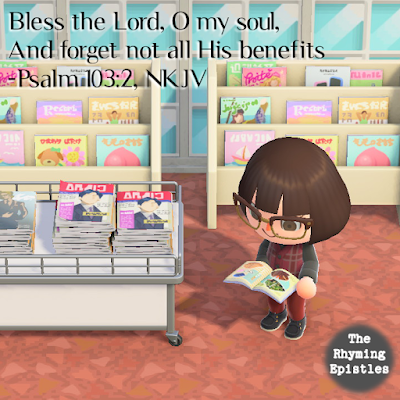I Offer My Life: To Love is To Sacrifice (Leviticus 9:1-7)
“All that I am, all that I have, I lay them down before you, oh Lord.” – Don Moen 🔥
Dear purpose pursuer,
Have you asked yourself for the reason why you are alive? Do
you think you’re just a worker bee in this world’s corporate hive? Or do you
think that the one in charge is you, that there’s no life-or-death consequence
with the things you do?
There’s just two ways to live: It’s either you live for God
or not. The second option is when you have another god other than Jesus Christ.
It could be you, money, or anything you hold as your first priority. How
you choose to live will determine your afterlife. You’ll either have eternal
life or face eternal death. Do you want to go where you’ll forever smile for
all tears are wiped away or where you’ll forever weep and gnash your teeth day
by day?
We’re on year 2022 now. Happy New Year! It’s fitting that
we’re starting with Leviticus now. You might think this is just for the
Levites or the priests, but Peter tells Christians that they're being built up as “a
holy priesthood, to offer up spiritual sacrifices acceptable to God through
Jesus Christ (1 Peter 2:5).”
Let’s take a glimpse of what the actual sacrifices were.
Leviticus 9:1-7 (NKJV)
It came to pass on the eighth day that Moses called Aaron and his sons and the elders of Israel. 2 And he said to Aaron, “Take for yourself a young bull as a sin offering and a ram as a burnt offering, without blemish, and offer them before the Lord. 3 And to the children of Israel you shall speak, saying, ‘Take a kid of the goats as a sin offering, and a calf and a lamb, both of the first year, without blemish, as a burnt offering, 4 also a bull and a ram as peace offerings, to sacrifice before the Lord, and a grain offering mixed with oil; for today the Lord will appear to you.’ ”
5 So they
brought what Moses commanded before the tabernacle of meeting. And all the
congregation drew near and stood before the Lord. 6 Then Moses said,
“This is the thing which the Lord commanded you to do, and the glory of the
Lord will appear to you.” 7 And Moses said to Aaron, “Go to the
altar, offer your sin offering and your burnt offering, and make atonement for
yourself and for the people. Offer the offering of the people, and make
atonement for them, as the Lord commanded.”
 |
| Moses instructing Aaron (created in Animal Crossing: New Horizons) |
The first five chapters of Leviticus are God’s instructions to
Moses on the offerings of the Israelites. Chapters 6 and 7 are the laws on the
offerings. Chapter 8 is the consecration of Aaron the high priest and his sons,
Nadab, Abihu, Eleazar, and Ithamar. Our passage today is the beginning of their
priestly ministry. This is why I wrote it's fitting for the new year.
The chapter opens 8 days after the priests’ week-long
consecration. Dr. McGee (1967) says in his radio program, Thru the Bible, that the
Hebrew word for consecration means "filling the hand." People who want to serve God must be consecrated in the sense that they empty
themselves, count their possessions loss, and see that they can’t boast of
anything before God. They must come empty-handed for Christ to fill them.
During the priests’ stay in the tabernacle, all they had with them were God’s
provisions, the garments as their clothing and the flesh of the ram and the
unleavened bread as their food.
They started their ministry by offering sacrifices for
themselves and for the people. The first thing offered was a sin offering for
Aaron. This is sacrificed for unintentional sins (Leviticus 4:2). Next was a
whole burnt offering. The skinned animal was to be completely burned on the
altar. This shows the offerers are dedicating their lives to God
The next offerings were for the people as they were
commanded in verses 3-4 of our text. A sin offering and a burnt offering were
offered for them as well. Then the priests sacrificed peace offerings for them.
This offering was for consecrating a meal between two or more parties before
God and sharing that meal together, committing to each other’s future
prosperity
What they didn’t offer was the guilt offering because it’s
for amending the violation against the holy things (Leviticus 5:15) and against
God’s commands (Leviticus 5:17). Since they’re just beginning the ministry,
they’ll have to deal with particular sins committed by the people after this.
After all their offerings, the glory of Lord appeared to the
Israelites. Fire came out and consumed the burnt offering and the fat on the
altar. This means God accepted their sacrifices
Priests serve their deity as mediators between the deity and
his worshippers
Let Your sacrifice teach us how to love generously. Lord,
let me give You all of me. Use me to share You to others that they may be part
of my sisters and brothers. I pray that they pray this, too. There’s nothing better in life to do.
With love,
Celina <3
References
Garrett, J. (2014, July 29). The 5 Offerings in
the Old Testament. Retrieved from Seedbed:
https://seedbed.com/5-offerings-old-testament/
Got Questions Ministries. (n.d.). What is a grain
offering? Retrieved from GotQuestions.org:
https://www.gotquestions.org/grain-offering.html
Jones, P. (n.d.). Leviticus 9. Leviticus | Holy.
Westminster, California, United States of America: Through the Word.
McGee, J. V. (1967). Leviticus 8:14—9:24.
Retrieved from Oneplace.com:
https://www.oneplace.com/ministries/thru-the-bible-with-j-vernon-mcgee/listen/leviticus-814924-926367.html
Ritenbaugh, J. (n.d.). What the Bible says about Priest as Mediator between God and Man. Retrieved from BibleTools.org: https://www.bibletools.org/index.cfm/fuseaction/topical.show/RTD/cgg/ID/11888/Priest-as-Mediator-between-God-Man.htm
Next: Holy, Holy, Holy: Set Apart from the Mundane (Leviticus 16:15-16, 20-22)


Comments
Post a Comment